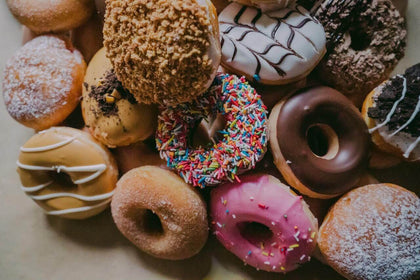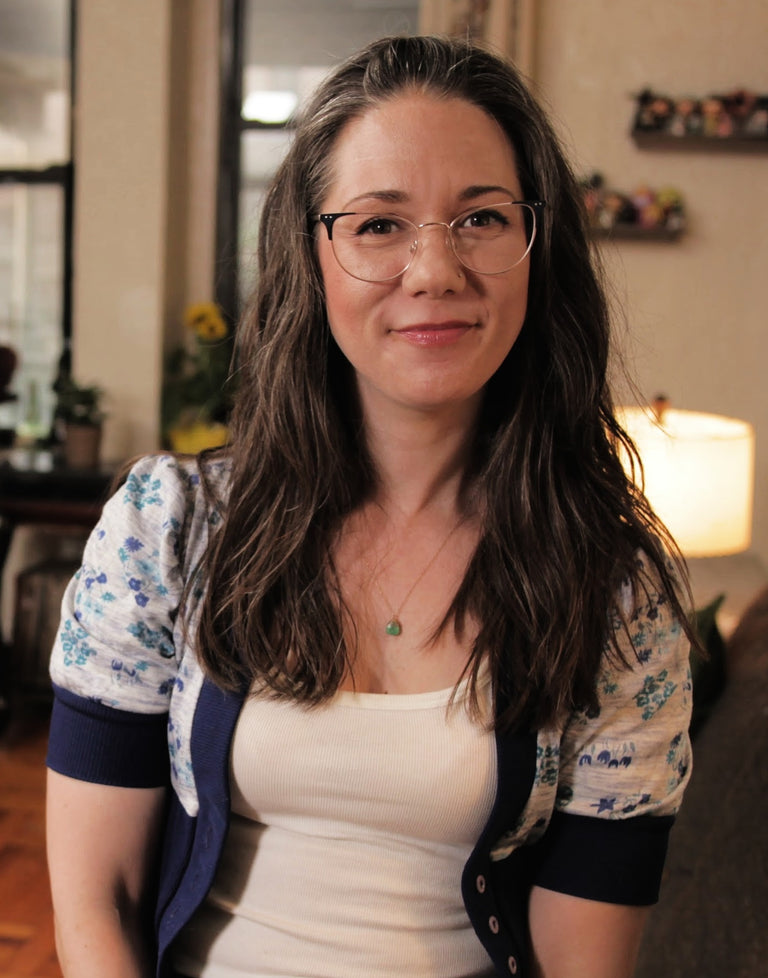Eating a well-balanced diet takes time, effort, mindfulness and organization, but sometimes you just can't make it happen. Unfortunately, if you fall into a pattern of eating poorly, it may lead to hair loss.
While there aren't specific foods that cause hair loss directly, there are a few things that are important to know when it comes to hair health and diet. Read on to find out what foods and eating habits might contribute to hair loss — plus what you should really be doing to encourage thicker, fuller looking hair.
#include-related-slider#
Sugary and High Glycemic Foods
Diets high in sugar can increase bodywide inflammation, cause weight gain and acne and increase your risk for heart disease, type 2 diabetes, cancer, depression, skin aging and more. In other words, it's wise to ditch the sugary cereals and sweet treats.
Foods high in sugar or foods with a high glycemic index (which means they are converted into sugar by the body) can cause blood sugar spikes that may lead to restricted blood flow to the hair follicles and may also contribute to androgenetic alopecia (male- and female-pattern baldness). Foods with lots of sugar or high glycemic indices also increase levels of oxidative stress in the body, which has a direct impact on hair health and aging.
Ready To GRO? Get Our Bestselling GRO More Kit
Foods High In Mercury
When ingested, mercury can disrupt the production of keratin, the main protein found in shafts of hair. In extreme cases, high levels of mercury in the bloodstream can even lead to one form of hair loss called anagen effluvium.
Mercury cell chlor-alkali products are used in the production of common food ingredients like high-fructose corn syrup, citric acid and sodium benzoate.
Find Out: What Is Anagen Effluvium?
Low Protein Diets
The human body produces the protein keratin to build each and every strand of hair. To do this, the body needs protein from dietary sources, so hair follicles have the building blocks they need.
If you make a sudden change to your diet that drastically cuts your protein supply, you might be faced with a form of temporary hair loss called telogen effluvium. Or, if you don’t consume adequate levels of protein over time, you might notice thinning hair, increased hair shedding, or a thinner, wispier hair texture.
While protein deficiencies are rare in Western countries, having unhealthy eating habits that are low on protein can impact your hair’s appearance and could lead to thinning hair! Healthy vegan and vegetarian sources of protein include seitan, tofu, tempeh, edamame, lentils, chickpeas and most beans.
Vitamin and Mineral Deficiencies
"Micronutrients like vitamins and minerals play a large role in overall health, including hair growth and loss,” said Emily Alexander, a functional nutritional therapy practitioner with Curated Wellness. “Deficiencies in nutrients like vitamin D, iron, selenium and the B complex vitamins may contribute to hair loss."
But that’s not all. Many essential vitamins and minerals support healthy hair growth. Here are a few deficiencies that have been observed in those who suffer hair loss.
Iron
Iron deficiency anemia is a common dietary deficiency among women, vegetarians and vegans. Unfortunately, it can also cause hair loss. When your body doesn’t have enough iron, it impedes red blood cells from delivering oxygen and nutrients to your follicles, and hair shedding can be one of the first signs that your body is low on iron.
“Try adding more iron-rich foods to your diet like nuts, seeds and fortified grains,” advised Jen Hernandez, a registered dietician with Plant-Powered Kidneys. “Also, be sure to pair iron-rich foods with vitamin C, which helps the body better absorb iron. Foods that are rich in vitamin C include citrus, tomatoes, strawberries, bell peppers and broccoli."
Note that foods containing phytates (cereals and grains) and polyphenols (tea and coffee) can hinder iron absorption.
Shop: Becky Hilliard's Top VEGAMOUR Picks
Zinc
Zinc is another important building block for keratin and is important for the general health and functioning of our follicles. So it makes sense that zinc deficiencies can lead to hair loss.
The good news is that studies have shown that zinc can help regrow hair in cases of deficiency. While zinc deficiencies aren’t very common, people who have malabsorption syndromes, like inflammatory bowel disease, may have trouble getting enough zinc. You can find zinc in fortified cereals and tofu.
Find Out: Can IBS Cause Hair Loss?
Vitamin D
Since most humans spend the majority of their time indoors, vitamin D deficiencies are common. And vitamin D deficiency has been linked to hair loss. Making sure you get enough vitamin D can not only have a positive effect on your hair but also provide bonus health benefits like better mood, healthy bones and a robust immune system.
Vitamin E
Vitamin E is very important to the health of our hair, nails and skin. It’s a powerful antioxidant that supports scalp health and protects our follicles. Without enough protective support from this vitamin, you could see increased hair fall due to free radical and oxidative damage.
And while supplementation with vitamin E may help encourage hair growth, too much vitamin E can also lead to hair loss. It’s a fine line when it comes to keeping our bodies in balance!
B Vitamins
The deficiency of several vitamins in the B family has been linked to hair loss: B-7 (biotin), B-2 (riboflavin), folate and B-12. Each of these B-vitamins contributes to overall hair follicle function and strand health. While deficiencies in biotin and riboflavin are rare, deficiencies in folate and B-12 are common.
Folate deficiencies can happen if you don’t eat enough leafy green vegetables or fresh fruits, and drinking too much alcohol can deplete your body’s folate levels, too. Most often, B-12 deficiencies happen in people who have malabsorption syndromes, but vegans, vegetarians and those with autoimmune diseases might also develop a deficiency. Oranges, spinach, barley and soybeans are good dietary sources of B-12.
Read: How Many Hairs Do You Lose Per Day?
Excess Vitamin A or Selenium
In the same way that vitamin and mineral deficiencies can contribute to hair loss, overdoing it might also lead to hair shed.
Vitamin A (retinol) is a fat-soluble vitamin that supports hair, vision and eye health. You can find vitamin A in foods like spinach, swiss chard and sweet potato. Supplementing with vitamin A can be helpful for people who have poor diets, but too much can contribute to hair loss.
It's the same with selenium. Excess selenium consumption and exposure have been linked to hair loss. Dietary sources of selenium include brown rice, sunflower seeds, Brazil nuts and cereals.
Learn: 12 Foods That Lower Cortisol
Drastic Weight Loss and Dieting
If you go on a very calorie-restrictive diet or suddenly lose a significant amount of weight, you might experience hair loss. Hair loss tied to sudden weight loss is typically telogen effluvium, a form of alopecia that happens when the body goes through a sudden shock or stressful event. It might also happen if your body just isn’t getting adequate nutrition when dieting over a long period.
"Restricting calories or cutting out major food or nutrient groups can lead to hair loss,” said Lisa Richards, nutritionist and author of The Candida Diet. “The most common causes of hair loss due to dieting is a lack of protein, fatty acids and especially zinc."
Fried Foods
Greasy foods that are deep-fried are typically devoid of healthy fats and often high in hydrogenated oils and may contribute to hair loss from a couple of different angles. One study suggests a link between fats that are commonly found in fried foods (like canola oil) and an increase in dihydrotestosterone (DHT) and testosterone levels, a hormone that has been linked to female- and male-pattern baldness.
Not only that, but the high-temperature cooking that comes along with deep-frying increases advanced glycation end products (AGEs), which are a group of highly oxidant compounds. These compounds have been found to increase bodily inflammation and oxidative stress (both of which can contribute to hair loss) and also have been linked to cardiovascular disease, diabetes and Alzheimer’s.
Find Out: 6 Foods That May Block DHT and Combat Thinning Hair
Alcohol
While alcohol doesn’t likely directly cause hair fall or hair thinning, it can contribute to it by impacting the absorption of vitamins and minerals that promote hair growth. It also impacts the healthy functioning of the thyroid, which secretes hormones directly related to the health of our skin and hair.
Try These Instead: The Best Foods for Healthy Hair Growth
Holistic Hair Health Made Easy
Team VEGAMOUR has crafted a full line of expertly formulated products to support fuller, thicker looking hair, even when you might not be able to eat as balanced a diet as you like.
Our GRO Biotin Gummies are gluten-free and vegan, providing not only biotin but also vitamins A, E, B-12, zinc, folate and more!
The Takeaway
Diet is a crucial part of your overall health, and since healthy hair starts from within, taking care of your general health means taking care of your locks, too. Avoiding these common dietary pitfalls is a solid step in supporting healthy hair growth, and finding ways to boost your hair health when you can’t be on top of a balanced diet won’t hurt either. But ultimately, one of the best ways to stimulate hair growth and care for the scalp microbiome is through a holistic approach to your overall health, including diet, exercise, stress management and a nourishing hair care routine that focuses on hair wellness.
#include-related-slider#
More From VEGAMOUR
- 10 Immune Boosting Habits to Add to Your Day
- Can Vitamin C Help Hair Grow?
- 10 Tips for Better Gut Health
- Can Ulcerative Colitis Cause Hair Thinning?
Photo credit: Rod Long/Unsplash
Back


















